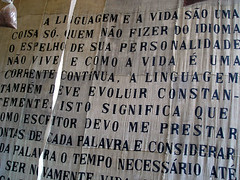
A linguagem e a vida são uma coisa só / Language and life are the same thing
Originally uploaded by Laura Klemz
Portuguese is not an easy language to learn, in fact I repeat from an earlier post, it's pretty frickin HARD. After studying virtually every Latin-based language out there, I still find Portuguese to be the most difficult to get a handle on....and I've lived here over a year now! I am referring to Portugal Portuguese of course, yes, there are 2 main types of Portuguese, Portugal and Brazilian (not counting the African Portuguese from Angola and Mozambique and all the island dialects) like British and American English but even more distant from each other. The main difference between the two when you hear them spoken is that Brazilian Portuguese is a lot more relaxed and exaggerated, almost sing-songy in the voice (makes for great music) with their 'd's pronounced like 'g's (ex. "bom dia"="bom gia") while Portugal Portuguese is very closed sounding and almost muffled at times with many words clipped at the end or shortened for quicker speaking. This closed, "stiffer" way of speaking makes Portugal Portuguese infinitely more difficult than Brazilian to understand and speak.
Like most Americans, I myself had only heard Brazilian Portuguese spoken (in Miami and lounge music) before I came to Portugal, which if you are familiar with Spanish, one can easily tell that Brazilian has similarities to it in its sound. The assumption is made then that Portugal Portuguese will sound a bit like Spanish as well. HAHAHAHA....not at all folks. In fact, I believe the first way I described how it sounded (and my friends agreed when they heard it too) was like a TV that had gone fuzzy with the snowy screen. :p Others have also described it almost sounding a bit like "Russian", especially when people talk faster than normal (which is still fast). And English-speaking people are not the only ones who have a hard time understanding Portuguese, both Brazilians and Spanish find it difficult as well, most of them don't even try to make an attempt to speak Portugal Portuguese when in Portugal. Yet the Portuguese people can easily transcribe into Brazilian when in Brazil and can also speak mix of Portuguese and Spanish (called "Portañol" by them) when in Spain that is understandable to most Spanish speakers.
But even with the big difference in pronunciation here, I still thought I could transfer most Spanish words into Portuguese, by the same silly way many Americans try to make English words into Spanish by adding an "el" at the beginning and an "o" to the end, like purse to "el purso" (a favorite of mine hehe). So I thought all I had to do was change the "el" for the Portuguese "o" and add an extra "o" sound to the end to make the common Portuguese "oo" sound at the end end of words. Well, I was half right there, and that's where it ended for easy transfer hahaha. This is because Portuguese is actually more closely related to Latin than Spanish is, with many words in Spanish deriving from Arabic actually, due to its history of Arab rule, while Portuguese remained more isolated and refusing to adopt new words from other language influences. You can find then more similarities in Portuguese with French (both use verb+infinitive for continuous form) and Italian (both use an article and possessive to preempt a noun ex. "il mio Italiano" and "o meu Português") with all three having many cognate verbs.
But I was still stubborn in my learning and after much trial and error, I found that there are cognate nouns in both Spanish and Portuguese with just a small root change. An easy one to remember is:
-If the first letter(s) of a noun in Spanish is followed by an "l", it will be an "r" instead in Portuguese (normally). Some examples: playa >> praia (beach), plata >> prata (silver), obligatorio >> obrigatorio (obligatory)
There are other somewhat simple, ES-PT root changes such as "-n" in ES to "-m" in PT (en=em, con=com) but are not as straightforward since they tend to be mixed with the "ie" in ES to "e" in PT (quiero=quero, quien=quem, bien=bem).
This all may help you out for reading and writing in Portuguese but the pronunciation of these words after the root changes is quite significant and much more difficult to even come close to saying the word correctly! I am still amazed at myself for having managed to get to at least an intermediary level of Portuguese without any classes within 1 year of living here. I credit this from just literally being forced to use the language everyday for sheer survival, and I've also come to believe that's the only way one can ever learn well-enough such a difficult language. You will surely read more about future adventures I have with Portuguese and hopefully if you ever decide to visit (or move! *gulp*) here, you will be better prepared than I was and LEAVE YOUR SPANISH at the door! ;D
No comments:
Post a Comment